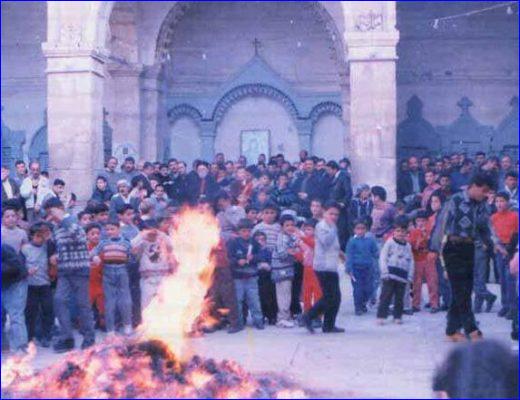


 Wikipedia)
Wikipedia)
Iraq, Iran, Syria and Turkey
The Assyrians, indigenous people of north-western Iran, northern Iraq, north-eastern Syria and south-eastern Turkey, who belong to the Assyrian Church of the East, Ancient Church of the East, Syriac Orthodox Church, and Chaldean Catholic Church, colloquially call Christmas Eda Zora, meaning 'little holiday'.
It is officially called Eda d'Yalde which means 'birthday holiday'. Traditionally, people fast (sawma) from December 1 until Christmas Day.
On Christmas Eve in Iraq, Assyrian families congregate outside their houses and hold lighted candles while a child reads the nativity story aloud. They then sing psalms over a bonfire made of thorn bushes. According to folklore, if the thorns burn to ashes, the family will have good luck. After the fire has been reduced to ashes, family members jump over the ashes three times and make a wish.
On Christmas day, as another bonfire burns in the churchyard, the bishop leads the service while carrying a figure of baby Jesus. After blessing one person with a touch, that person touches the next person and 'the touch' is passed around until all have felt the touch of peace.
The fast is broken by eating traditional Assyrian foods like pacha/reesh-aqle (meaning 'from the head to the tail'), which is a boiled soup made of sheep or cow intestines, tongue, stomach, legs, and spices or harissa, a porridge made of ground wheat and chicken -- both dishes are prepared overnight and are only made twice a year: on Christmas and Easter.
After the feast, they visit the houses of family and friends to exchange Christmas greetings, saying 'Eedokhon breekha' ('May your feast be blessed').
Ethiopia and Eritrea
The public holiday for Christmas Day in Eritrea is celebrated on January 7 or on 27 Tahsas of the Ethiopian calendar. Christmas is called Ledet in Eritrea or Gena in Ethiopia. Christian people from both countries fast for 40 days -- called 'the fast of the prophets', after which they gather at church at dawn on Christmas morning.
On Christmas Day, there are colourful musical celebrations involving priests dressed in their best robes performing rituals, dancing and play drums and other instruments.
Everyone dresses in white and heads off to church. In the afternoon the traditional game of Gena (a kind of hockey) is played -- according to Ethiopian legend, the game was played by shepherds tending their flocks on the night of Jesus's birth.
Most Ethiopians wear a traditional 'Shamma', a thin, white cotton wrap with brightly coloured stripes across the ends.
The holiday is followed with a three-day festival called 'Timkat', which starts on January 19, to celebrate the baptism of Jesus Christ.
China
December 25 is not a legal holiday in China, but is still designated as a public holiday in the special administrative regions of Hong Kong and Macau, both former colonies of Western powers.
The small percentage of Chinese citizens who consider themselves Christians (unofficially and usually privately) on the mainland do observe Christmas. Many others celebrate Christmas-like festivities even though they don't consider themselves Christians.
Many customs, including sending cards, exchanging gifts and hanging stockings are very similar to Western celebrations.
India
Being a British colony until 1947, many traditions stood the test of time in India. Although Christianity in India is a minority, with only 2.3 percent of the 1.237 billion population, Christmas is a state holiday.
In India most Christians, especially Catholics, attend midnight mass and many homes are decorated for Christmas with brightly lit stars hanging outside houses. Neighbours exchange sweets and cakes and many schools run by the Christian missionaries actively take part in Christmas programs.
Christmas is known as 'Badaa Din' (big day) in North and North-West India.
Mexico
In Mexico, Christmas is a statutory holiday and workers get the day off -- with pay. There are over 30 traditions -- found only within a Mexican Christmas.
Groups of townspeople go from door to door -- just like Mary and Joseph, parents of the unborn baby Jesus, looking for shelter on their arrival in Bethlehem. They are periodically invited inside to take part in breaking a candy-filled piñata over a period of nine days.
Festivities start on December 12, with the feast of La Guadalupana (Virgin of Guadalupe), and ends on January 6, with the Epiphany when, according to tradition, the Three Wise Men brought gifts to Bethlehem for Jesus Christ. Santa Claus (or Santa Clos, as he's known in Mexico) is who brings the children their gifts, but traditionally the Three Wise Men will fill the children's shoes with candies, oranges, tangerines, nuts, and sugar cane, and sometimes money or gold.

or register to post a comment.